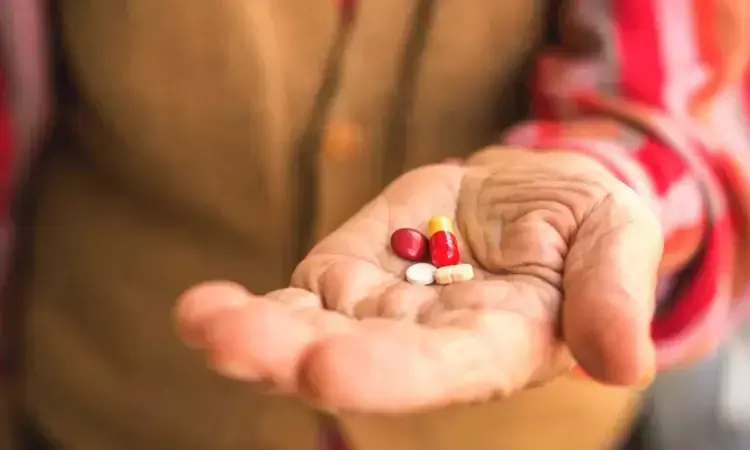- Home
- Medical news & Guidelines
- Anesthesiology
- Cardiology and CTVS
- Critical Care
- Dentistry
- Dermatology
- Diabetes and Endocrinology
- ENT
- Gastroenterology
- Medicine
- Nephrology
- Neurology
- Obstretics-Gynaecology
- Oncology
- Ophthalmology
- Orthopaedics
- Pediatrics-Neonatology
- Psychiatry
- Pulmonology
- Radiology
- Surgery
- Urology
- Laboratory Medicine
- Diet
- Nursing
- Paramedical
- Physiotherapy
- Health news
- Fact Check
- Bone Health Fact Check
- Brain Health Fact Check
- Cancer Related Fact Check
- Child Care Fact Check
- Dental and oral health fact check
- Diabetes and metabolic health fact check
- Diet and Nutrition Fact Check
- Eye and ENT Care Fact Check
- Fitness fact check
- Gut health fact check
- Heart health fact check
- Kidney health fact check
- Medical education fact check
- Men's health fact check
- Respiratory fact check
- Skin and hair care fact check
- Vaccine and Immunization fact check
- Women's health fact check
- AYUSH
- State News
- Andaman and Nicobar Islands
- Andhra Pradesh
- Arunachal Pradesh
- Assam
- Bihar
- Chandigarh
- Chattisgarh
- Dadra and Nagar Haveli
- Daman and Diu
- Delhi
- Goa
- Gujarat
- Haryana
- Himachal Pradesh
- Jammu & Kashmir
- Jharkhand
- Karnataka
- Kerala
- Ladakh
- Lakshadweep
- Madhya Pradesh
- Maharashtra
- Manipur
- Meghalaya
- Mizoram
- Nagaland
- Odisha
- Puducherry
- Punjab
- Rajasthan
- Sikkim
- Tamil Nadu
- Telangana
- Tripura
- Uttar Pradesh
- Uttrakhand
- West Bengal
- Medical Education
- Industry
Investigational GLP-1 Receptor Agonist effective in Lowering HbA1c in Early Type 2 Diabetes: NEJM

A recent phase III randomized trial found an investigational oral small-molecule GLP-1 receptor agonist significantly reducing the glycated hemoglobin (HbA1c) levels in adults with early-stage type 2 diabetes, indicating its potential as an effective oral treatment option. The findings were published in The New England Journal of Medicine.
The trial enrolled 559 adults who were managing their type 2 diabetes with diet and exercise alone. The participants were randomly assigned to receive one of 3 doses of orforglipron (3 mg, 12 mg, or 36 mg) or a placebo once daily for 40 weeks. All participants had a starting glycated hemoglobin (HbA1c) level between 7.0% and 9.5%, and a body mass index (BMI) of at least 23.
By the end of the 40-week trial, orforglipron significantly outperformed the placebo in reducing HbA1c levels. On average, HbA1c levels dropped by 1.24 percentage points with the 3 mg dose, 1.47 points with the 12 mg dose, and 1.48 points with the 36 mg dose. The patients on placebo experienced a modest 0.41-point reduction. This translates to a mean HbA1c of approximately 6.5–6.7% for orforglipron users, nearing the American Diabetes Association’s target range for good glycemic control.
The participants taking orforglipron saw body weight reductions of 4.5% (3 mg dose), 5.8% (12 mg), and 7.6% (36 mg), when compared to just 1.7% for those on placebo. These effects align with the known weight-loss potential of GLP-1 receptor agonists, that includes injectable therapies like semaglutide.
Adverse effects were mostly nausea and diarrhea, which occurred primarily during the dose-escalation phase. These side effects were generally mild to moderate, and no severe hypoglycemia was reported. However, 4.4% to 7.8% of orforglipron recipients discontinued the drug due to side effects, when compared to 1.4% in the placebo group.
Unlike most GLP-1 receptor agonists currently available, which require injection, orforglipron offers patients a once-daily pill alternative. This convenience could significantly improve treatment adherence and accessibility for individuals who are hesitant about injections.
Overall, these findings confirm the strong potential of orforglipron as an effective and well-tolerated option for managing blood sugar and supporting weight loss in people with early type 2 diabetes. Larger and longer-term studies are expected to provide further insight into its durability and safety.
Source:
Rosenstock, J., Hsia, S., Nevarez Ruiz, L., Eyde, S., Cox, D., Wu, W.-S., Liu, R., Li, J., Fernández Landó, L., Denning, M., Ludwig, L., & Chen, Y. (2025). Orforglipron, an oral small-molecule GLP-1 receptor agonist, in early type 2 diabetes. The New England Journal of Medicine. https://doi.org/10.1056/nejmoa2505669
Neuroscience Masters graduate
Jacinthlyn Sylvia, a Neuroscience Master's graduate from Chennai has worked extensively in deciphering the neurobiology of cognition and motor control in aging. She also has spread-out exposure to Neurosurgery from her Bachelor’s. She is currently involved in active Neuro-Oncology research. She is an upcoming neuroscientist with a fiery passion for writing. Her news cover at Medical Dialogues feature recent discoveries and updates from the healthcare and biomedical research fields. She can be reached at editorial@medicaldialogues.in
Dr Kamal Kant Kohli-MBBS, DTCD- a chest specialist with more than 30 years of practice and a flair for writing clinical articles, Dr Kamal Kant Kohli joined Medical Dialogues as a Chief Editor of Medical News. Besides writing articles, as an editor, he proofreads and verifies all the medical content published on Medical Dialogues including those coming from journals, studies,medical conferences,guidelines etc. Email: drkohli@medicaldialogues.in. Contact no. 011-43720751


